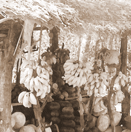| |
Focus City Project: Community-based Assessment and Improvement of Living Environments of Under Served Settlements and its Environs: The Case of Gothamipura - Colombo
Client: Colombo Municipal Council (CMC)
Duration: June 2007 to December 2009
Following previous collaborations with the Colombo Municipal Council (CMC), CEPA has been a part of a CMC-led action research project that is funded by the International Development Research Centre (IDRC), Canada and forms a part of a regional initiative involving eight cities.
The action research project aims to contribute to improving the living conditions of a selected under-served settlement (USS) - Gothamipura in Colombo and its surrounding neighbourhood - by increasing access to selected services, reducing environmental burdens and improving vulnerable living conditions. CEPA’s role is to develop and operationalise the monitoring and evaluation process, consolidate and communicate learning from the action research to local and international stakeholders.
The CMC operational objective is to use water and sanitation (focusing on sewerage) as an entry point to develop a participatory service-delivery model. The learning objectives are to improve knowledge of the link between poverty (as expressed in terms of financial, socio-political, resource and human assets) and environmental burdens (such as flooding, health issues, and poor sanitation) and to assess how improved access to services contributes to an improved sense of land tenure security. It also has a long term institutional objective of trying to use the project model to improve CMC initiatives and policies relating to urban service provision and poverty reduction; and a capacity building objective that seeks to enhance the team’s capability to do participatory research and communication and be involved in a learning network with other Focus City teams and with the community.
Two years into the project, the work is yielding some interesting insights into urban poverty and the relationships among community members and other stakeholder of the under-served settlements. Community participation is clearly linked to actual activities occurring and the priority given by them to these activities. Distrust, questioning and criticism has reduced and the community became very supportive as the actual work started.


Survey on Willingness and Ability to Pay for Pro-Poor Household Water Connections
Client: ECO-Asia – USAID
Duration: September 2008 to March 2009
CEPA carried out an assessment on urban poor households’ willingness and ability to pay for water services through house connections, for the Environmental Cooperation-Asia (ECO-Asia), a USAID regional project working on urban water and sanitation issues. The assessment included design and implementation of a survey using contingency valuation methods to establish market demand and willingness to pay for individual water services. The information generated from the study will inform ECO-Asia’s strategy to support the National Water Supply and Drainage Board (NWSDB) to increase coverage of individual house connections among poor urban households in Sri Lanka.
The survey was carried out in 248 households in 15 purposively selected under-served settlements (USS) in the municipalities of Moratuwa, Dehiwala/Mount-Lavinia and Colombo, where there is a high concentration of USS and use of public facilities. The findings showed a very high demand for better water services. However, the experience with applying willingness to pay methodology showed that households articulated their ability rather than willingness to pay, therefore indicating that pro poor water policies and strategies need to consider this gap between demand/the felt need and affordability, as well as the diverse nature of USS and that giving individual water connections alone may not be adequate to improve the living conditions of urban poor.
|
